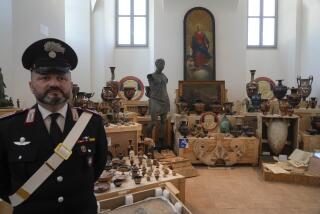To the aid of a museum
- Share via
The looting of the National Museum in Baghdad has spurred widespread concern among archeologists, scholars, conservators and arts administrators in the West. Struggling to assess the loss and make sense of conflicting reports, they have rallied to the cause of retrieving and restoring the stolen art and artifacts.
In Washington, D.C., the American Assn. of Museums held a meeting April 16 of representatives from 17 American cultural heritage organizations to gather facts and assess needs. Members of the group concluded that they must communicate with their peers in Iraq to establish priorities, call for the protection of Iraq’s cultural resources and insist upon the inclusion of cultural heritage needs in reconstruction plans.
They also agreed to seek private, business and government funding for cultural reconstruction.
In London, the British Museum on April 29 assembled an international gathering -- including high-level representatives of Unesco, the Louvre, the state museums of Berlin and the Getty Conservation Institute -- to create a “first-aid kit” for the National Museum in Baghdad. The group got an update of the damage from Donny George, the Iraqi museum’s director, but they didn’t draft a plan.
“What everyone realized was that it was too soon to develop an appropriate first-aid kit because there was not enough data,” said Timothy P. Whalen, director of the Getty institute.
In New York, a group of archeologists and scholars who had been invited to speak at a conference at the Metropolitan Museum of Art held a private, impromptu meeting Tuesday. They created the American Coordinating Committee for the Iraqi Cultural Heritage and discussed several pressing needs, including the control of Iraq’s borders so that looted materials don’t leave the country, and the security of archeological sites, particularly in remote areas.
“We are also very concerned that the inventory of the museum’s collection be done by individuals with academic and museum qualifications, not the military, and that guards and other people who worked in the museums be rehired,” said Patty Gerstenblith, a specialist in cultural property law who teaches at De Pauw University College of Law in Chicago.
In Lyon, France, at the headquarters of the Interpol international police organization, a two-day meeting Monday and Tuesday concentrated on compiling a database of stolen items so that suspicious objects can be scrutinized.
Money is also beginning to come in. The U.S. State Department has announced a contribution of $2 million to help protect and restore key museums and archeological sites in Iraq. The funds will establish a U.S. research center in Baghdad and support the development of the Red List of Iraqi Antiquities at Risk, a general guide to categories of looted objects to be compiled by the International Council of Museums. The U.S. donation will also support a searchable database of the Baghdad museum’s collection.
Among other contributions, the Italian government has given $400,000 to the cause without specifying how it should be used. The Swiss government has authorized $250,000 for a database of information about looted and damaged material.
“The happy news is that the entire world of Mesopotamian archeology, curators and people interested in conservation is poised and ready to help,” the Getty’s Whalen said. But so far, most efforts have been stymied by a lack of information about the extent of the loss.
“What we have,” he said, “is great moral support in a time vacuum.
More to Read
The biggest entertainment stories
Get our big stories about Hollywood, film, television, music, arts, culture and more right in your inbox as soon as they publish.
You may occasionally receive promotional content from the Los Angeles Times.










